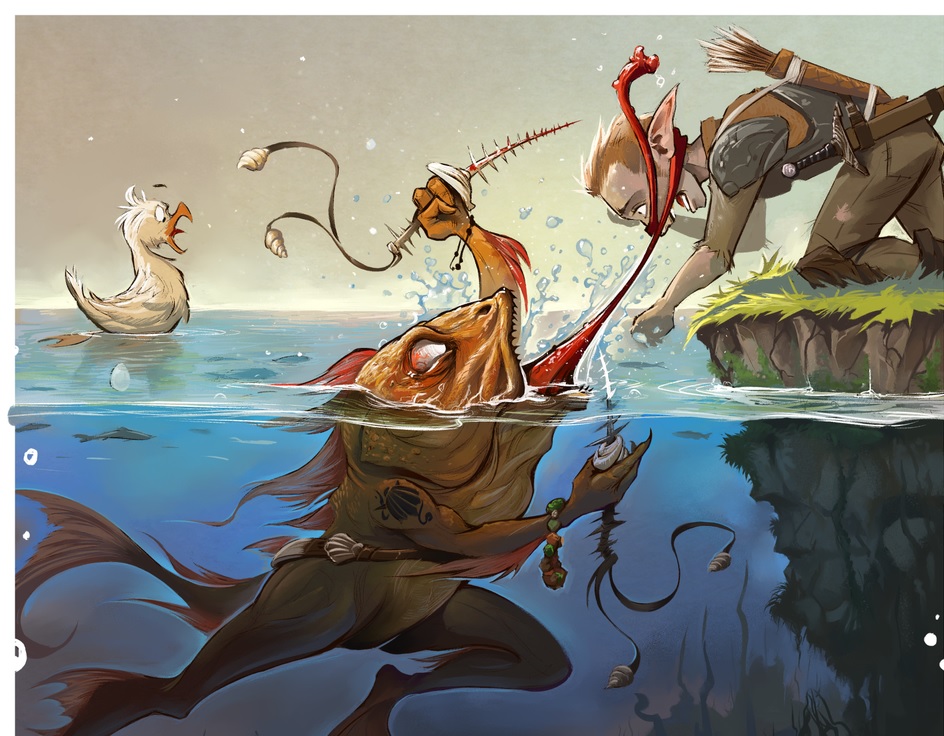Difference between revisions of "Locathah"
Tao alexis (talk | contribs) |
Tao alexis (talk | contribs) |
||
| Line 15: | Line 15: | ||
| attack = by weapon type | | attack = by weapon type | ||
| dmg = varies | | dmg = varies | ||
| − | | special = dagger & trident, [[Speak with Animals (spell)|speak with animals]], [[Tongue (attack)|tongue]] | + | | special = dagger & trident, [[Speak with Animals (spell)|speak with animals]],<br>[[Tongue (attack)|tongue]] |
}} | }} | ||
| − | The '''locathah''' are a humanoid race of aquatic nomads, roaming shallow seas [[Hunting (technology)|hunting and gathering]]. They have fish-like heads with large eyes | + | The '''locathah''' are a humanoid race of aquatic nomads, roaming shallow seas [[Hunting (technology)|hunting and gathering]]. They are best known for raids along the coast of the Red and Arabian seas, and have been spotted in the Persian Gulf. They have been known to trade pearls and corals for mithril or with fishing vessels for some of that day's catch. Locathah have fish-like heads with large ears like fins and big, glassy eyes. They're covered with scales and possess hairlike growths that sprout behind their ears and below their chins. Their mouths are toothless. |
| + | |||
| + | == History == | ||
| + | They've had almost no impact on terran history. Contact between the surface and these creatures began only a century ago, and may have been encouraged by Portuguese traders. There are no examples of locathah mercenaries attacking coasts, but small parties do plunder very occasionally; it is supposed that increased fishing in their habitats has reduced their food supply. Envoys to learn what locathah want or even to investigate their culture have produced little. It is guessed that there are as few as 20 to 40 thousand of these creatures in existence. | ||
| + | |||
| + | == Fighting == | ||
| + | Locathah | ||
| + | and toothless mouths. Locathah prefer to fight with tridents, but they also have short knives; both are typically made of hard bone, with multiple serrated points. | ||
[[File:Locathah.jpg|left|350px]] | [[File:Locathah.jpg|left|350px]] | ||
Revision as of 15:56, 3 September 2020
| Species | humanoid (ichthyes) |
| No. Appearing | 3–30 |
| Behaviour | clan |
| Range | intertidal, ocean banks |
| Size | 5 ft. 9 in. tall |
| Weight | 190 lbs. |
| Intelligence | 11–12 |
| Armour Class | 6 |
| Hit Dice | 2+3 |
| Action Points | 5 |
| Max. Stride | {{{stride}}} |
| THAC0 | 19 |
| Hp/Die | d8 |
| Attack Forms | by weapon type |
| Damage | varies |
| Special Attacks | dagger & trident, speak with animals, tongue |
The locathah are a humanoid race of aquatic nomads, roaming shallow seas hunting and gathering. They are best known for raids along the coast of the Red and Arabian seas, and have been spotted in the Persian Gulf. They have been known to trade pearls and corals for mithril or with fishing vessels for some of that day's catch. Locathah have fish-like heads with large ears like fins and big, glassy eyes. They're covered with scales and possess hairlike growths that sprout behind their ears and below their chins. Their mouths are toothless.
History
They've had almost no impact on terran history. Contact between the surface and these creatures began only a century ago, and may have been encouraged by Portuguese traders. There are no examples of locathah mercenaries attacking coasts, but small parties do plunder very occasionally; it is supposed that increased fishing in their habitats has reduced their food supply. Envoys to learn what locathah want or even to investigate their culture have produced little. It is guessed that there are as few as 20 to 40 thousand of these creatures in existence.
Fighting
Locathah
and toothless mouths. Locathah prefer to fight with tridents, but they also have short knives; both are typically made of hard bone, with multiple serrated points.
They have a long tongue that they can use when out of water to seize hold of an enemy; if they hit with it, this tongue does no damage but will stun an opponent up to the locathah's size. It is common for locathah to use this attack to pull their enemies into the water, where they will be less able to defend themselves; a stunned victim must make a dexterity check (-4 penalty) or else topple forward.
They are known to dwell in warm, sub-tropical seas the world-wide, though they are most plentiful from the Malabar Coast to the East Indies. They have no king, but there are rumours that they are so common in some undersea lands that no other seagoing race may encroach there.
See Bestiary
